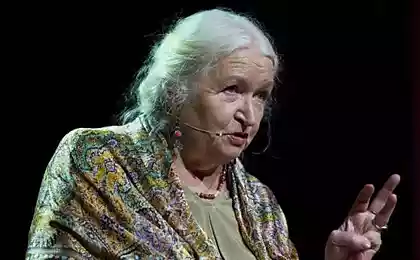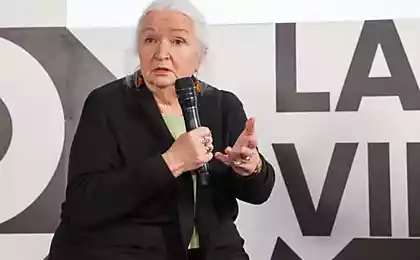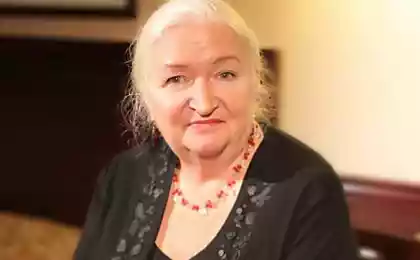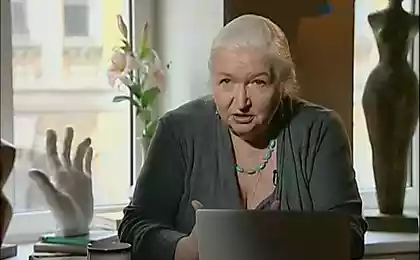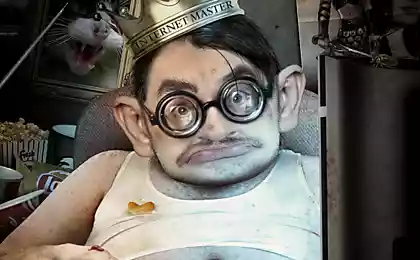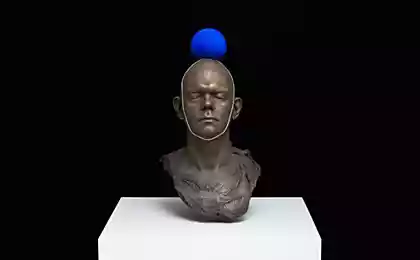629
Tatiana Chernigovskaya: the World may be a hallucination
What is the secret of the brain and consciousness? How do intuition and "sixth sense"? Why geeks don't grow up to be geniuses?
This and many other questions in an interview rasskazannaya and experimental psychologist, doctor of physiology and biology, Professor, head of laboratory for cognitive studies, St. Petersburg state University Tatiana Chernigovskaya.
— Tatiana, you have a lot of years studying the brain. There many mysteries in it, still not explicable from the point of view of science?
— Brain activity — one big mystery. How it works, actually nobody knows. And anyway, what is the brain? It is sometimes said that this is a very powerful computer. But that's not true. A certain part of the brain may really work as the processor. But the other — otherwise. What is easy for the brain, it is difficult for a computer and Vice versa. In the computer in order to find some information, you need to give the system the exact address. But in real life we often deal with uncertain information. Like, say, with recipes — add salt to taste, saute until cooked...
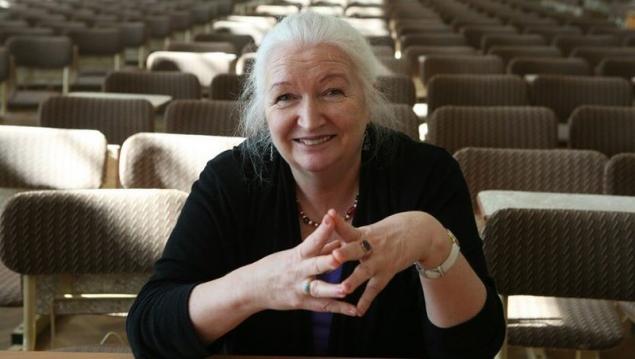
— The more that everyone has their own idea about the readiness of...
— Yes, and you can't give such information to the computer. And if you give, then he simply will not understand. Or, suppose you call by phone a taxi and the driver asks: how to you drive? You say: but you will pass a little bit, and there will be a house curve, you will travel, will continue to be the bushes, so you in their direction don't go and turn a little right -- This is all information a non-digital type. The computer would not accept. And the driver will listen, Orient and drive where you want.
The computer likes clear certain data. You can argue: Yes, but then there are other, more sophisticated computers. Well, here when will be — then we'll talk...
How the brain manages, being so incredibly difficult not to go crazy — a mystery to me. And anyway, how is it possible to coordinate the work, when the bill goes to a quadrillion connections between the different parts of such a device? Meanwhile it works in General for everybody including very stupid.
We think we know about the brain already very much. The best universities in the world participate in the largest mega-projects with huge funding, and all for the sake of cognition of the brain. But the most important questions in this field remain absolutely untouched.
I will say that in 10 years we will have a technique that will show each neuron. And what the hell they gave me? Their brain 120 billion. Why do I information about each of them, what am I going to do with it? Well, well, so turn those 120 billion, and now commercials — then what? This gives us only knowledge about small details. And we need to understand the main thing — where did the consciousness. We want a different answer, and to get it, there are no devices...
So, you need a genius who will find the solution?
Who to start, how I put the question. We want to find a specific address in the brain? Find out where and what information is there? For example. Why? First, there are no such places — it's not a wardrobe with drawers, and a complex neural network that changes all the time and reformatted. And information about any subject, event, impression now will be here and then there, because the associations connected with it, I have others. And every single Association, every minute acquires new, because in the brain there is no stability.
I know I replied to my colleagues. They would say: are those supercomputers that are still not counted. But it's a joke. Well, count. And then what? I need not numbers, and the meaning. And its just the computer does not. We're going to find consciousness, not knowing what it is that we must find. Even if it is suddenly so graciously brought before us, we simply do not know.
Someone thinks, but can't understand what is his own consciousness?
— You can say, Yes. Scientists can't agree on this topic. Some say that consciousness is just a reaction of the body. But then, I'm sorry, it is and animal, bird, fish, insect, ciliate — that is in all living beings. And the flower that grows in a pot in your home, it too — can you imagine? Or say that consciousness is a reflection, understanding their actions. But in this case, consciousness does not have 90% of the population, because the vast majority of people never react, and simply live like grass... What is consciousness? Nezahodnye in a coma, Wake? Here you can tell? I don't.
Science known cases when a man came out of a long coma and remembered what had happened to him all this time...
— The fact of the matter is. That is, remember what happened to him when he, in fact, was a stone... That this will offer to make? This is true, such evidence quite a lot. We can't pretend that they are not!
There is such a thing as the experience or impression from the first person. This is something that is not measured by physical devices. Here you drink tea, for you it is too sweet, but for me, on the contrary, not enough. You like this music, but I don't. Warm, delicious, disgusting, bad, good... these are things that cannot be fixed by scientific methods. If something fixes it, it is, paradoxically, not a science, but an art...
As mentioned Tsvetaeva, "reader — co-author". That is the same book different people will read differently. If they, God forbid, will begin its recount, it may seem like they all read different works. Moreover, it is possible they both understood that meant the author, but did it in different ways.
Question: where in this case contains the meaning of the book? Not exactly in it. Because, as said Yuri Lotman (Russian scholar, literary critic, historian, anthropologist, ed.), there occurs the self-expansion of the senses. After the book is written, its starting to read by different people. And it all depends on what century it occurs, and what age the readers what education and training they received, what their tastes, political views and life experience... So where are the meanings? In mind reading, watching, listening, thinking — or in the mind of the writer? Thinking about? That's just the same.
— In your opinion, the thought can be transmitted at a distance? They say a mother knows what her child, even if he is far away...
— I know about it. There's too much evidence about such events, that we might not to believe them. When people "turn on," or "include" in a kind of invisible link, he begins to worry terribly, and his heart beat is recorded by the devices. And at the same time with his loved ones on the other side of the world there are some extraordinary events... It's like something need to explain. It would be possible to say that all invented. Right there! Many invented, but there are the real facts.
On the other hand, science involves testability and repeatability of the event, and to check and to repeat something like that specially impossible. Therefore, there are no statistics of such cases. These are things that defy our rules of the game. What to do with them, science does not know.
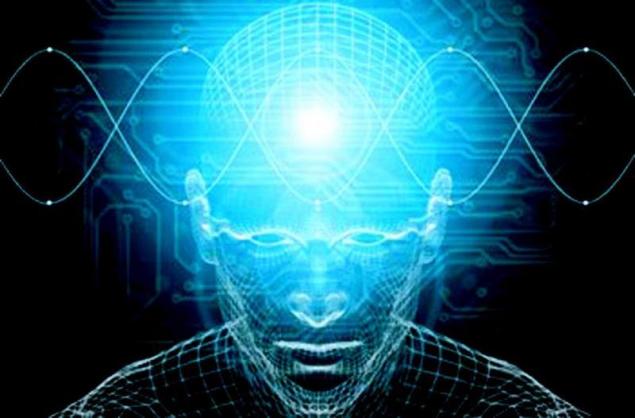
— Are you studying the phenomenon of insight. How does this ability? It is known that the inspiration comes unexpectedly to the individual, it is unclear how often illogical and inexplicable...
— There are many different types of logic. When we say "logical-illogical", we mean Aristotle's logic: A plus To gives C, C plus D gives E, etc. something can be illogical within the framework of this particular system but in another system the same has to be quite logical. You know?
Yes, the insight occurs suddenly. But this happens usually with those people who have thought long and hard about some problem. They one side they get close to her, and with another — that didn't work, and that way, too. But the brain continues to work, and in dreams no less than in the waking state. That is, the mechanism is spinning, spinning, and at some point in time the solution was found. And it happened all the same in the brain. We have yet another candidate for the role of "Creator illumination", in addition to the neural network, which does an incredible job complexity.
For example, Einstein's brain has been well studied — it was studied with the help of scanners. Obviously, it was the brain of a genius — in the sense that with the brain, Einstein could not accept myself. What do you mean? Not that his brain was large in size (by the way, the big brain is just the sick minded people). Einstein's brain was extremely complicated structure.
For example, he was a very powerful jumper, which is called "case collosum" and connects right and left hemisphere. This is important because discoveries are made primarily through associative processes. Let's say you're observing neutrinos. And at some point you walk across the field and see butterflies fly and flowers grow, or remember the works of your favorite writers — and then suddenly in the brain occurs fantastically perfect the formula of the area of these neutrinos. So, you must be the brain, which is not "specialized" classes physics, because then you'll be a good physicist but not a genius. Discoveries are those who look wider, who can see a standard solution, say, in an ocean wave that comes from afar... genius must be the brain that with this "case collosum" involve to solve the problem the right hemisphere is usually responsible for the realization of art, music, the elements...
— Sherlock Holmes, as you know, played the violin...
— And you know what he did? I guess. Einstein, incidentally, also played the violin — really, really bad. But it doesn't matter. He did not play for the audience and for ourselves — to tune into insight.
— Often scientists, who approach scientific issues creatively, open what you can't see their more traditional colleagues. And that is what are them bits. Example — the son of two poets Lev Gumilyov, who is not very fond of historians from academic science...
— The bits are all original thinkers, because they violate the rules of the game. For example, we agreed that doing things a certain way. Then someone comes and says: "And what makes you think that this is the only way? Let's try another way". But any violation of the status quo is annoying, because tradition is comfortable. Traditions maintain stability in society. It can't explode revolutions every second! However, discoveries made at the turn of the traditions.
— You once said that genius is an anomaly on the verge of madness...
— What is the norm? The norm is something secondary to what we agreed. Let's say we agree that this season wear skirts a certain length, and in the next season or two. It is not better or worse. Frame here is arbitrary. But deviation from them is considered a pathology, by definition...
Genius — it can be very good and can be very good plus schizophrenia. Because all men of genius is very expensive to pay for their abilities. Among them we find mentally healthy. One mental illness for another drink, the third tried to commit suicide... geniuses sacrificial life. Not because they have an idea to make mankind happy, but because they are born that way. And in the end they will not accept a society...
— So, genius is a painful property of the brain?
— Not necessarily. So I will answer this way: genius is a special brain. Genius, of course, can only be born. It can not be realized, because the genius is genes plus a great job. Not that that's got adequate genetic inheritance from our ancestors — and all on the buzz. The genius lives a terrible life, with huge losses and incredible round the clock. If this for some reason does not occur, then, alas, the genes of the genius are lost... you Can get inherited a Stradivarius, but the trouble is that you need to learn how to play it. You can't just go and waggle tool. So Yes it's a heavy legacy. Not even know to envy such people, or to sympathize with.
And then the question arises: here, we have a lot of geeks — what happens to them when they grow up?
— Director of the Institute of human brain RAS Svyatoslav Medvedev once said that geeks do not become geniuses. Why?
— And the truth is, they disappear somewhere! It seems that this sverhordinarnogo child should grow up the genius — but for some reason this is not happening. It is known that Bach, for example, was beaten on the fingers to play the organ, almost to a chair tied. So the question arises, to force or allow the genius to grow their own, like a flower — that will ripen, it will ripen. The paradox here is that if forced under duress, then perhaps there would be no Bach, no Stradivarius...
I recently watched a television competition for young musicians, and at one point felt a tingling on the skin. A child of five sitting at the piano, his feet not touch the pedals, and he said, "I of three years decided that I was a pianist". What is it?.. The only thing left is to wish these children to the Lord was merciful to them and that they weren't crazy ahead of time, just be healthy. Because they carry such a load, which may not survive...
But if we want everyone included in the category of psychological and physical standards, we agree with the fact that will lose the best — how would they expel. And this will end our civilization, because it was created just "crazy"...
I mean, what a terrible responsibility rests on teachers and schools. Once there, the genius kids are pariah, in the category of those who laugh at someone tapping. Moreover, they displace not only children but also teachers. For example, the boy says: "Twice two is not always four." He said: "Sit down, the unit. Let your parents come to school..."
Or another example. Nobel laureate in quantum mechanics — for example, Niels Bohr and Erwin schrödinger, studying in an ordinary modern school, was bound to get low marks in physics. If they passed the exam, their life would be regrettable. Because they would have answered the questions not as a means exam or a school textbook, and they would say: "You're either stupid or a slacker". They could answer: "You two-I can of course put any points, only that the Nobel prize, I'm just gonna wait to receive it some time..."
On the other hand, what these children do? To give to a school for geniuses? If they are too spoiled from the very beginning to make it clear that they are outstanding, they are still gonna go crazy. So here we need some very intelligent, kind, gracious, experienced teachers who will be able to keep the situation from bias both in one and in the other direction. And it's almost impossible.
— Whether it is possible to recognize in the child of genius? And if so, by what criteria? Obviously, a brilliant teacher?
Yeah, I mean the story is almost hopeless. However, in Moscow there are several schools where this culture if not of genius, the intellectual elite, the finest brains. There is useless to come through connections, not having the relevant skills and talents, very quickly it turns out that the child "pulls". Such schools have to live by their rules. It is necessary to provide them with the opportunity to recruit such teachers, what they want, that is, to give to freemen.
— How teachers should handle most gifted children?
— I think the sense of smell. The teacher should be not so equal to his disciple, but at least, so to speak, from the same litter. He must feel that this particular child needs to behave in a particular way. This is what tells flair.

Then there is intuition, the sixth sense... And how does it work?
— What sixth sense is, is the fact. But nobody knows what it is. The word "instinct", "intuition" — like jokers. When you don't know what to say, then saying, "Ah, it's instinct." It's just a play on words, it does not carry any information.
I know one thing: intuition should be trusted. It works.
— Do you have one?
— Is. And if my inner voice says: "don't do it!", and I still do, failure is inevitable.
— You will immediately realize that this "inner voice", or realize over time?
— Rather immediately. I read faces, pay attention to human speech. And sometimes I get unmotivated inner anxiety, not be explained under any circumstances. That is, nothing seems to be going wrong, but the heart still aches. Why? At least torture me — no answer.
At such moments, I don't understand myself, but say for example: "I will Not go there. Don't want to. In the end, I gave the oath to go?" And then it turns out that if I had, you probably would have got involved in some unpleasant affair, when all quarreled to the nines. And how active people would have been on someone's side. In short, climbed into the trash, which I, of course, is not necessary. I learned about this only later. But something inspired me to not to go there.
Is a property of the brain, I think?
— Of course, of the brain. What else? Not liver.published
Interviewed By Vladimir Voskresensky
P. S. And remember, just changing your mind — together we change the world! ©
Source: www.rosbalt.ru/russia/2017/02/11/1590526.html
This and many other questions in an interview rasskazannaya and experimental psychologist, doctor of physiology and biology, Professor, head of laboratory for cognitive studies, St. Petersburg state University Tatiana Chernigovskaya.
— Tatiana, you have a lot of years studying the brain. There many mysteries in it, still not explicable from the point of view of science?
— Brain activity — one big mystery. How it works, actually nobody knows. And anyway, what is the brain? It is sometimes said that this is a very powerful computer. But that's not true. A certain part of the brain may really work as the processor. But the other — otherwise. What is easy for the brain, it is difficult for a computer and Vice versa. In the computer in order to find some information, you need to give the system the exact address. But in real life we often deal with uncertain information. Like, say, with recipes — add salt to taste, saute until cooked...

— The more that everyone has their own idea about the readiness of...
— Yes, and you can't give such information to the computer. And if you give, then he simply will not understand. Or, suppose you call by phone a taxi and the driver asks: how to you drive? You say: but you will pass a little bit, and there will be a house curve, you will travel, will continue to be the bushes, so you in their direction don't go and turn a little right -- This is all information a non-digital type. The computer would not accept. And the driver will listen, Orient and drive where you want.
The computer likes clear certain data. You can argue: Yes, but then there are other, more sophisticated computers. Well, here when will be — then we'll talk...
How the brain manages, being so incredibly difficult not to go crazy — a mystery to me. And anyway, how is it possible to coordinate the work, when the bill goes to a quadrillion connections between the different parts of such a device? Meanwhile it works in General for everybody including very stupid.
We think we know about the brain already very much. The best universities in the world participate in the largest mega-projects with huge funding, and all for the sake of cognition of the brain. But the most important questions in this field remain absolutely untouched.
I will say that in 10 years we will have a technique that will show each neuron. And what the hell they gave me? Their brain 120 billion. Why do I information about each of them, what am I going to do with it? Well, well, so turn those 120 billion, and now commercials — then what? This gives us only knowledge about small details. And we need to understand the main thing — where did the consciousness. We want a different answer, and to get it, there are no devices...
So, you need a genius who will find the solution?
Who to start, how I put the question. We want to find a specific address in the brain? Find out where and what information is there? For example. Why? First, there are no such places — it's not a wardrobe with drawers, and a complex neural network that changes all the time and reformatted. And information about any subject, event, impression now will be here and then there, because the associations connected with it, I have others. And every single Association, every minute acquires new, because in the brain there is no stability.
I know I replied to my colleagues. They would say: are those supercomputers that are still not counted. But it's a joke. Well, count. And then what? I need not numbers, and the meaning. And its just the computer does not. We're going to find consciousness, not knowing what it is that we must find. Even if it is suddenly so graciously brought before us, we simply do not know.
Someone thinks, but can't understand what is his own consciousness?
— You can say, Yes. Scientists can't agree on this topic. Some say that consciousness is just a reaction of the body. But then, I'm sorry, it is and animal, bird, fish, insect, ciliate — that is in all living beings. And the flower that grows in a pot in your home, it too — can you imagine? Or say that consciousness is a reflection, understanding their actions. But in this case, consciousness does not have 90% of the population, because the vast majority of people never react, and simply live like grass... What is consciousness? Nezahodnye in a coma, Wake? Here you can tell? I don't.
Science known cases when a man came out of a long coma and remembered what had happened to him all this time...
— The fact of the matter is. That is, remember what happened to him when he, in fact, was a stone... That this will offer to make? This is true, such evidence quite a lot. We can't pretend that they are not!
There is such a thing as the experience or impression from the first person. This is something that is not measured by physical devices. Here you drink tea, for you it is too sweet, but for me, on the contrary, not enough. You like this music, but I don't. Warm, delicious, disgusting, bad, good... these are things that cannot be fixed by scientific methods. If something fixes it, it is, paradoxically, not a science, but an art...
As mentioned Tsvetaeva, "reader — co-author". That is the same book different people will read differently. If they, God forbid, will begin its recount, it may seem like they all read different works. Moreover, it is possible they both understood that meant the author, but did it in different ways.
Question: where in this case contains the meaning of the book? Not exactly in it. Because, as said Yuri Lotman (Russian scholar, literary critic, historian, anthropologist, ed.), there occurs the self-expansion of the senses. After the book is written, its starting to read by different people. And it all depends on what century it occurs, and what age the readers what education and training they received, what their tastes, political views and life experience... So where are the meanings? In mind reading, watching, listening, thinking — or in the mind of the writer? Thinking about? That's just the same.
— In your opinion, the thought can be transmitted at a distance? They say a mother knows what her child, even if he is far away...
— I know about it. There's too much evidence about such events, that we might not to believe them. When people "turn on," or "include" in a kind of invisible link, he begins to worry terribly, and his heart beat is recorded by the devices. And at the same time with his loved ones on the other side of the world there are some extraordinary events... It's like something need to explain. It would be possible to say that all invented. Right there! Many invented, but there are the real facts.
On the other hand, science involves testability and repeatability of the event, and to check and to repeat something like that specially impossible. Therefore, there are no statistics of such cases. These are things that defy our rules of the game. What to do with them, science does not know.

— Are you studying the phenomenon of insight. How does this ability? It is known that the inspiration comes unexpectedly to the individual, it is unclear how often illogical and inexplicable...
— There are many different types of logic. When we say "logical-illogical", we mean Aristotle's logic: A plus To gives C, C plus D gives E, etc. something can be illogical within the framework of this particular system but in another system the same has to be quite logical. You know?
Yes, the insight occurs suddenly. But this happens usually with those people who have thought long and hard about some problem. They one side they get close to her, and with another — that didn't work, and that way, too. But the brain continues to work, and in dreams no less than in the waking state. That is, the mechanism is spinning, spinning, and at some point in time the solution was found. And it happened all the same in the brain. We have yet another candidate for the role of "Creator illumination", in addition to the neural network, which does an incredible job complexity.
For example, Einstein's brain has been well studied — it was studied with the help of scanners. Obviously, it was the brain of a genius — in the sense that with the brain, Einstein could not accept myself. What do you mean? Not that his brain was large in size (by the way, the big brain is just the sick minded people). Einstein's brain was extremely complicated structure.
For example, he was a very powerful jumper, which is called "case collosum" and connects right and left hemisphere. This is important because discoveries are made primarily through associative processes. Let's say you're observing neutrinos. And at some point you walk across the field and see butterflies fly and flowers grow, or remember the works of your favorite writers — and then suddenly in the brain occurs fantastically perfect the formula of the area of these neutrinos. So, you must be the brain, which is not "specialized" classes physics, because then you'll be a good physicist but not a genius. Discoveries are those who look wider, who can see a standard solution, say, in an ocean wave that comes from afar... genius must be the brain that with this "case collosum" involve to solve the problem the right hemisphere is usually responsible for the realization of art, music, the elements...
— Sherlock Holmes, as you know, played the violin...
— And you know what he did? I guess. Einstein, incidentally, also played the violin — really, really bad. But it doesn't matter. He did not play for the audience and for ourselves — to tune into insight.
— Often scientists, who approach scientific issues creatively, open what you can't see their more traditional colleagues. And that is what are them bits. Example — the son of two poets Lev Gumilyov, who is not very fond of historians from academic science...
— The bits are all original thinkers, because they violate the rules of the game. For example, we agreed that doing things a certain way. Then someone comes and says: "And what makes you think that this is the only way? Let's try another way". But any violation of the status quo is annoying, because tradition is comfortable. Traditions maintain stability in society. It can't explode revolutions every second! However, discoveries made at the turn of the traditions.
— You once said that genius is an anomaly on the verge of madness...
— What is the norm? The norm is something secondary to what we agreed. Let's say we agree that this season wear skirts a certain length, and in the next season or two. It is not better or worse. Frame here is arbitrary. But deviation from them is considered a pathology, by definition...
Genius — it can be very good and can be very good plus schizophrenia. Because all men of genius is very expensive to pay for their abilities. Among them we find mentally healthy. One mental illness for another drink, the third tried to commit suicide... geniuses sacrificial life. Not because they have an idea to make mankind happy, but because they are born that way. And in the end they will not accept a society...
— So, genius is a painful property of the brain?
— Not necessarily. So I will answer this way: genius is a special brain. Genius, of course, can only be born. It can not be realized, because the genius is genes plus a great job. Not that that's got adequate genetic inheritance from our ancestors — and all on the buzz. The genius lives a terrible life, with huge losses and incredible round the clock. If this for some reason does not occur, then, alas, the genes of the genius are lost... you Can get inherited a Stradivarius, but the trouble is that you need to learn how to play it. You can't just go and waggle tool. So Yes it's a heavy legacy. Not even know to envy such people, or to sympathize with.
And then the question arises: here, we have a lot of geeks — what happens to them when they grow up?
— Director of the Institute of human brain RAS Svyatoslav Medvedev once said that geeks do not become geniuses. Why?
— And the truth is, they disappear somewhere! It seems that this sverhordinarnogo child should grow up the genius — but for some reason this is not happening. It is known that Bach, for example, was beaten on the fingers to play the organ, almost to a chair tied. So the question arises, to force or allow the genius to grow their own, like a flower — that will ripen, it will ripen. The paradox here is that if forced under duress, then perhaps there would be no Bach, no Stradivarius...
I recently watched a television competition for young musicians, and at one point felt a tingling on the skin. A child of five sitting at the piano, his feet not touch the pedals, and he said, "I of three years decided that I was a pianist". What is it?.. The only thing left is to wish these children to the Lord was merciful to them and that they weren't crazy ahead of time, just be healthy. Because they carry such a load, which may not survive...
But if we want everyone included in the category of psychological and physical standards, we agree with the fact that will lose the best — how would they expel. And this will end our civilization, because it was created just "crazy"...
I mean, what a terrible responsibility rests on teachers and schools. Once there, the genius kids are pariah, in the category of those who laugh at someone tapping. Moreover, they displace not only children but also teachers. For example, the boy says: "Twice two is not always four." He said: "Sit down, the unit. Let your parents come to school..."
Or another example. Nobel laureate in quantum mechanics — for example, Niels Bohr and Erwin schrödinger, studying in an ordinary modern school, was bound to get low marks in physics. If they passed the exam, their life would be regrettable. Because they would have answered the questions not as a means exam or a school textbook, and they would say: "You're either stupid or a slacker". They could answer: "You two-I can of course put any points, only that the Nobel prize, I'm just gonna wait to receive it some time..."
On the other hand, what these children do? To give to a school for geniuses? If they are too spoiled from the very beginning to make it clear that they are outstanding, they are still gonna go crazy. So here we need some very intelligent, kind, gracious, experienced teachers who will be able to keep the situation from bias both in one and in the other direction. And it's almost impossible.
— Whether it is possible to recognize in the child of genius? And if so, by what criteria? Obviously, a brilliant teacher?
Yeah, I mean the story is almost hopeless. However, in Moscow there are several schools where this culture if not of genius, the intellectual elite, the finest brains. There is useless to come through connections, not having the relevant skills and talents, very quickly it turns out that the child "pulls". Such schools have to live by their rules. It is necessary to provide them with the opportunity to recruit such teachers, what they want, that is, to give to freemen.
— How teachers should handle most gifted children?
— I think the sense of smell. The teacher should be not so equal to his disciple, but at least, so to speak, from the same litter. He must feel that this particular child needs to behave in a particular way. This is what tells flair.

Then there is intuition, the sixth sense... And how does it work?
— What sixth sense is, is the fact. But nobody knows what it is. The word "instinct", "intuition" — like jokers. When you don't know what to say, then saying, "Ah, it's instinct." It's just a play on words, it does not carry any information.
I know one thing: intuition should be trusted. It works.
— Do you have one?
— Is. And if my inner voice says: "don't do it!", and I still do, failure is inevitable.
— You will immediately realize that this "inner voice", or realize over time?
— Rather immediately. I read faces, pay attention to human speech. And sometimes I get unmotivated inner anxiety, not be explained under any circumstances. That is, nothing seems to be going wrong, but the heart still aches. Why? At least torture me — no answer.
At such moments, I don't understand myself, but say for example: "I will Not go there. Don't want to. In the end, I gave the oath to go?" And then it turns out that if I had, you probably would have got involved in some unpleasant affair, when all quarreled to the nines. And how active people would have been on someone's side. In short, climbed into the trash, which I, of course, is not necessary. I learned about this only later. But something inspired me to not to go there.
Is a property of the brain, I think?
— Of course, of the brain. What else? Not liver.published
Interviewed By Vladimir Voskresensky
P. S. And remember, just changing your mind — together we change the world! ©
Source: www.rosbalt.ru/russia/2017/02/11/1590526.html
Breathing exercise of the Reich: dissolve muscular armor
This product is a powerful protection against cancer and other dangerous diseases



